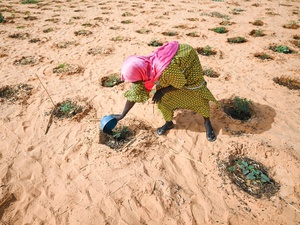UNHCR: Humanitarian needs remain acute for displaced in flood-hit areas of Pakistan
UNHCR: Humanitarian needs remain acute for displaced in flood-hit areas of Pakistan

UNHCR staff deliver emergency relief items to Afghan refugees in Kheshgi refugee village in Pakistan's north-western Khyber Pakhtunkhwa province.
UNHCR, the UN Refugee Agency, is continuing to support the government-led relief efforts in flood-hit parts of Pakistan, where the situation remains dire. Authorities and humanitarian agencies are racing against time to reach the affected population – with close to 8 million people now displaced.
UNHCR continues to coordinate logistics as part of a plan to transport over 1.2 million relief items to local authorities in the most flood-affected areas. So far, we have delivered over 1 million life-saving items to authorities for distribution. In addition, all 22 scheduled UNHCR airlifts transporting much-needed relief items have arrived in Pakistan.
Some 7.6 million people have been displaced by the floods, according to the latest estimates, with nearly 600,000 living in relief sites. Many parts of the country, especially in the southern Sindh province, remain under water. Officials warn that it could take up to six months for flood waters to recede in the hardest-hit areas, as fears rise over threats of waterborne diseases and the safety of millions of people including women and children. In all, 33 million people have been affected by the floods.
Pakistan is home to some 1.3 million registered Afghan refugees, an estimated 800,000 of whom are hosted in more than 45 'calamity hit' districts out of 80 affected locations. Four of the worst-hit districts in Balochistan, Khyber Pakhtunkhwa and Sindh provinces host the highest number of refugees.
With the delivery of aid, UNHCR and partners have begun rolling out emergency cash assistance to flood-affected refugees to supplement the Government’s monsoon response. Hundreds of vulnerable refugee families in Khyber Pakhtunkhwa, Balochistan, Sindh and Punjab will receive one-time support.
We are also part of a rapid needs assessment programme aimed at better understanding the needs on the ground. Inter-agency humanitarian teams have been deployed and reinforced with female staff to guarantee more comprehensive data collection from affected communities. In addition, UNHCR has trained more than 25 UN agency and NGO staff in multiple locations to ensure key protection principles are observed.
Ensuring access to education remains a key priority as the floods have disrupted learning for some 30,000 refugee and host community children. UNHCR has started conducting detailed assessments on schools damaged by monsoon rains in Balochistan and Khyber Pakhtunkhwa. Some 69 schools have been damaged in refugee villages in Khyber Pakhtunkwa and Balochistan.
As Pakistan faces a colossal challenge to respond to this climate disaster, UNHCR reiterates its call for more support for the country and its people, who have generously hosted Afghan refugees for over four decades. The scale of devastation from the monsoon on people and infrastructure is hard to comprehend.
According to Pakistan’s National Disaster Management Authority (NDMA), over 1,500 people have lost their lives, including 552 children killed. More than 12,900 injuries have been recorded since mid-June, over 4,000 of whom are children. Over 2 million houses have been destroyed or damaged across the country.
For more information on this topic, please contact:
- In Islamabad, Aoife McDonnell, [email protected], +92 3202 538 941
- In Islamabad, Qaiser Khan Afridi, [email protected] +92 300 5018696
- In Bangkok (regional), Babar Baloch, [email protected], +66 80 086 5611
- In Bangkok (regional), Kasita Rochanakorn, [email protected], +66 64 932 0803
- In Geneva, Matthew Saltmarsh, [email protected]; +41 79 967 99 36
- In New York, Kathryn Mahoney, [email protected], +1 347 443 7646









